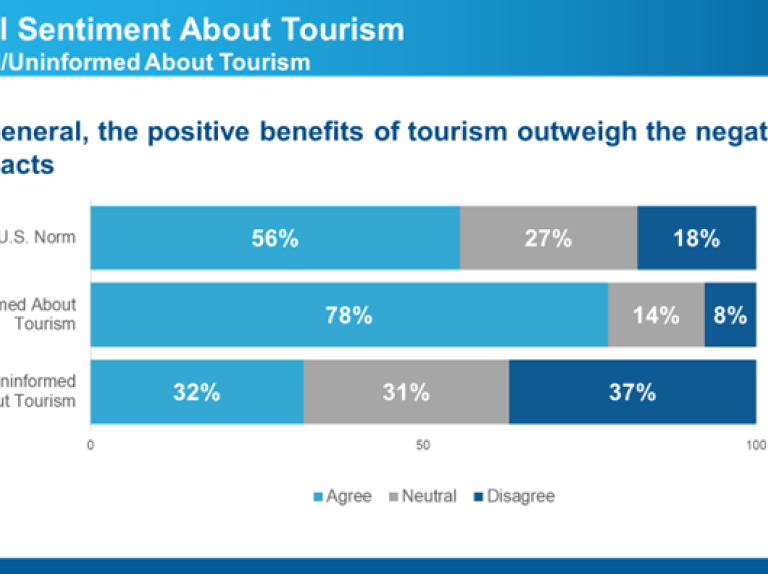
By Andreas Weissenborn, Destinations International Foundation
With every fall we have welcomed a new round of research from our partners over at Longwoods International with the release of their annual national resident sentiment study. It has been our third year highlighting the data and insights at our advocacy summit and our continued tactical approach to being a community shared value by listening to your number #1 customer, the resident. In 2020, Longwoods International fielded the largest National Resident Sentiment Study conducted to date, utilizing a national online consumer research panel of 4,000 adults. The scale and scope of this study make insights available on the regional and generational level for the first time, allowing for both a national benchmark evaluation, as well as evaluations of nuances across the country.

Up front, a couple conclusions from the study at large:
- Most Americans agree the benefits of tourism outweigh the negatives.
- While Americans overwhelmingly support tourism growth, there is room to improve their inclusion in the planning process.
- However, even among those informed about the tourism industry, they predominately do not see the industry as a creator of high-paying jobs.
- When residents are informed about travel and tourism, their support for funding, development, and overall growth of the industry increases significantly.
- Residents largely favor government support and funding for tourism promotion, while the opportunity does exist to grow the level of this support.
Plenty from the research shows a lot of groundwork and goodwill has been built by destination organizations towards the resident, however its important for us dissect some of the current disconnects so we can continue to treat our residents as our first customer, the front door to tourism, and the industry advocate and beneficiary.
Residents support tourism and see the community benefit but do not understand where it originates from.
Across both intersections of local or state government, residents largely agree on the support/aide of the promotion of tourism. However, if its asked differently, showing the connection of public funds to partially fund tourism marketing efforts, agreement waivers, and those who are both informed and especially uniformed push to disagree. We then still have work to do to help continue to make the argument for destination promotion being a common good, once which needs continued investment for a community to compete and thrive.
Residents believe tourism should be encouraged but skew towards thinking it causes cost of living to go up for their community.
This is not the case for over tourism, this is a failure of destination management. We must maintain this delicate balance between building quality of place against smothering or inflating quality of living. When it begins with a visit, and turns to a resident, it must continue and be maintained as a steward to both.
In general, the positive benefits of tourism outweigh the negative impacts…except when it comes to low paying jobs.
Again, this points to continued work and advancements needed in brand management and stewardship. We will only be as good as a fractured brand if it is only believed that our efforts produce only low paying jobs into our community. Our efforts put people in our community to work everyday. Some of these might be dishwashers but some of these might be general managers, yet both equally matter. Our workforce presents opportunities for many in a community at any part of their career’s journey. We take young and inexperienced and provide purpose and take experienced and seasoned and give relevance.


